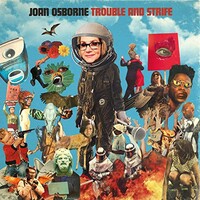

OSBORNE: (Singing) Hands off of things that don't belong to you. To me, that was sort of the impetus for the song, is there's so many people who are in positions of power who are abusing that power right now. You know, it doesn't have to be about a single person. There's so many people who are corrupt and openly corrupt right now. OSBORNE: I mean, gosh, you know, look around. SIMON: Anyone in particular you hope hears the song? Hands off of things that don't belong to you. They gave you 99 servants to carry out your trash. OSBORNE: (Singing) They made you clean and shiny. SIMON: Let's hear a bit from "Hands Off."

(SOUNDBITE OF JOAN OSBORNE SONG, "HANDS OFF") It's because that's what was on my mind at the time. And I think that's why the record is so political. And this was a much more of a just sort of shoot-from-the-hip, immediate, first-thought-that-comes-in-your-mind kind of thing. And what came out of it were songs that are very much about what's going on in the world and are - you know, usually, I take a long time and fuss over songs. So I basically locked myself into a room for four days and pulled out all my little notes and scraps. Then I said, you know what? I'm tired of singing other people's songs. So I was, like, well, should I do, you know, Bob Dylan songs two, or should I pick another songwriter like Lou Reed - and kept, you know, putting off the decision until it was about four days before the session. You know, the album that I did before this was a record of Bob Dylan songs. And I didn't know what we were going to do. But, you know, I had a studio, and I had musicians booked. That's normally my MO, is to procrastinate for as long as humanly possible. SIMON: I've read in an interview you gave to Salon where you said almost every song here was written in four days - four days? I mean, we talked to people who take four years. OSBORNE: (Singing) Just a young girl taken from her home. (SOUNDBITE OF SONG, "WHAT'S THAT YOU SAY") And, you know, we were both in tears at certain points in the interview. And it was a really emotional experience to talk with her about it. And what you hear in the song is her telling her story of coming here from Mexico as a little girl and coming to this place and always feeling like an outsider. And I thought, well, why don't I essentially hand the mic over to someone who has actually lived this experience? So Ana Maria and I got on the phone. And I just kept hearing, like, a spoken word thing that seemed to want to be in there.

And we had these big instrumental passages all throughout the song. And I wanted to write a song about a character who has made that journey.Īnd so I wrote the song. OSBORNE: I wrote the song, really, as a response to what I see as this very sort of confusing conversation about immigration in our country right now because I have always understood immigration to be a great, positive thing for our country and that people who come here bring, with them, you know, their enterprise and their energy and their music. An issue certainly we want to talk about on "Trouble And Strife" is immigration - the song "What's That You Say." And it includes Spanish passages read by Ana Maria Rea. I'm a huge NPR geek, so I'm very, very happy to do this. And Joan Osborne, whose hits include "One Of Us" and "Right Hand Man," joins us now from upstate New York. SIMON: Transgender rights, climate change, disinformation, immigration all get a hard look from this multi-Grammy-nominated and multi-platinum-selling artist. JOAN OSBORNE: (Singing) She sees them out on the street in the morning, the hard legs in the slim headwalk. In these days of social unrest and uprising, Joan Osborne is releasing her most political album, "Trouble And Strife."


 0 kommentar(er)
0 kommentar(er)
